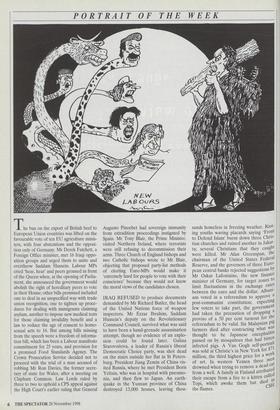PORTRAIT OF THE WEEK
The ban on the export of British beef to European Union countries was lifted on the favourable vote of ten EU agriculture minis- ters, with four abstentions and the opposi- tion only of Germany. Mr Derek Fatchett, a Foreign Office minister, met 16 Iraqi oppo- sition groups and urged them to unite and overthrow Saddam Hussein. Labour MPs cried 'hear, hear' and peers groaned in front of the Queen when, at the opening of Parlia- ment, she announced the government would abolish the right of hereditary peers to vote in their House; other bills promised included one to deal in an unspecified way with trade union recognition, one to tighten up proce- dures for dealing with immigrants claiming asylum, another to impose new medical tests for those claiming invalidity benefit and a law to reduce the age of consent to homo- sexual acts to 16. But among bills missing from the speech were a freedom of informa- tion bill, which has been a Labour manifesto commitment for 25 years, and provision for a promised Food Standards Agency. The Crown Prosecution Service decided not to proceed with the trial of a man accused of robbing Mr Ron Davies, the former secre- tary of state for Wales, after a meeting on Clapham Common. Law Lords ruled by three to two to uphold a CPS appeal against the High Court's earlier ruling that General Augusto Pinochet had sovereign immunity from extradition proceedings instigated by Spain. Mr Tony Blair, the Prime Minister, visited Northern Ireland, where terrorists were still refusing to decommission their arms. Three Church of England bishops and two Catholic bishops wrote to Mr Blair, objecting that proposed party-list methods of electing Euro-MPs would make it 'extremely hard for people to vote with their conscience' because they would not know the moral views of the candidates chosen.
IRAQ REFUSED to produce documents demanded by Mr Richard Butler, the head of the United Nations force of weapon inspectors. Mr Ezzar Ibrahim, Saddam Hussein's deputy on the Revolutionary Command Council, survived what was said to have been a hand-grenade assassination attempt, though no evidence of an explo- sion could be found later. Galina Starovoitova, a leader of Russia's liberal Democratic Choice party, was shot dead on the stairs outside her flat in St Peters- burg. President Jiang Zemin of China vis- ited Russia, where he met President Boris Yeltsin, who was in hospital with pneumo- nia, and then flew to Japan. An earth- quake in the Yunnan province of China destroyed 13,000 houses, leaving thou- sands homeless in freezing weather. Riot- ing youths waving placards saying 'Front to Defend Islam' burnt down three Chris- tian churches and ruined another in Jakar- ta; several Christians that they caught were killed. Mr Alan Greenspan, the chairman of the United States Federal Reserve, and the governors of three Euro- pean central banks rejected suggestions by Mr Oskar Lafontaine, the new finance minister of Germany, for target zones to limit fluctuations in the exchange rates between the euro and the dollar. Albani- ans voted in a referendum to approve a post-communist constitution; expecting few voters to take part, the government had taken the precaution of dropping 3 proviso of a 50 per cent turnout for the referendum to be valid. Six Malaysian pig farmers died after contracting what wa.s thought to be Japanese encephalitis passed on by mosquitoes that had bitten infected pigs. A Van Gogh self-portrait was sold at Christie's in New York for $71 million, the third highest price for a work of art. In western Yemen three me° drowned when trying to remove a deadcat. from a well. A family in Finland attributed their escape from a fire to a kitten called Topi, which awoke them but died in the flames.


























































































 Previous page
Previous page